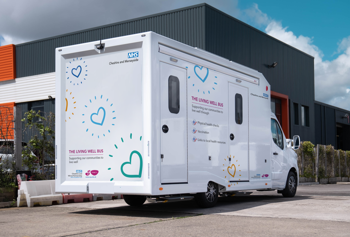Roving vaccination service launched during Covid continues to support residents with vaccinations and health checks
Monday, 8 July 2024

Cheshire and Wirral Partnership’s Living Well Service
Cheshire and Wirral Partnership NHS Foundation Trust’s roving COVID-19 vaccination service was initially introduced in Cheshire in June 2021 to specifically improve vaccination access within communities identified as under-served by mass vaccination provision.
Over the following 12 months, the Living Well Service vaccinated over 13,000 people in low uptake cohorts, including areas of high deprivation, people of non-white British ethnicity, support settings for the homeless, refugees and asylum seekers, maternity services settings, faith settings and mental health and learning disability support settings.
During this period the service demonstrated what can be achieved by developing an agile operational framework that brings services to the heart of historically disengaged communities, combined with a meaningful engagement strategy that focuses on listening and learning.
Due to its successes in Cheshire, June 2022 saw the Living Well Service scale up operations across Cheshire and Merseyside.
While maintaining its ongoing offer of COVID-19 vaccinations, the service also began providing physical health checks, dedicated mental health support and wider wellbeing guidance – driven by the priorities outlined in NHS England’s Core20PLUS5 approach to reducing health inequalities.
In July 2023 the service expanded its clinical offer to provide routine vaccinations to adults and children within migrant hotels and initial accommodation settings to improve vaccination access and engagement for migrant health purposes.
In response to the national measles incident announced in January 2024 following a surge in measles cases in the country, the service began to offer all routine UK immunisations, with a focus on increasing uptake of the MMR (measles, mumps and rubella) vaccine.
Spotlight on inclusion health – Roma communities
In Liverpool, the Living Well Service has worked alongside partners to help drive uptake in low uptake areas which had a high population of Romanian, Slovak, Czech Republic, Hungarian and Lithuanian nationalities – of which many identify as Roma.
Roma are one of the largest and most marginalised ethnic minority groups in Europe and have experienced an extensive history of discrimination, persecution and social exclusion. In the UK, Roma experience inequalities in standards of living, education, employment and health.
Vaccination uptake has been reported as lower in Roma communities compared to non-Roma communities across Europe. Roma communities in the UK have particularly been found to experience language and literacy and discrimination as barriers to vaccination and health service access.
The service continues to work alongside public health to identify the most appropriate ways in which to remain visible, engage and build trust with these communities in order to help reduce vaccine hesitancy and increase uptake.
Spotlight on inclusion health – the homeless
The Living Well Service has also been utilised to target those experiencing homelessness, in collaboration with public health and third sector partners such as YMCA, SHAP, night shelters, winter accommodation centres and homeless support groups.
The bus made visits to over 80 locations across Cheshire and Merseyside, including repeat visits, to offer vaccinations and NHS health checks, including homeless shelters, hostels, women’s refuges, residential rehabilitation services, emergency accommodation, alcohol harm reduction centres and day centres.
A range of local offers were developed to encourage and assist vaccinations including offering incentives such as supermarket vouchers and wellbeing packs, as well as engaging with soup kitchens and other outreach services to bring clinics directly to service users who otherwise would not receive the offer.
Outreach work to target those who are homeless and within the eligible criteria continues to take place via bus visits to identified locations, as well as drop-in clinics facilitated by primary care networks (PCNs) commissioned to provide enhanced services for the homeless.